Total Croatia in Ukrainian: Word of Support by Former Ukrainian Diplomat and Writer Jurij Lisenko
July 12, 2021 - As the Total Croatia site offers translations on all things Croatian in various languages, former diplomat and a famous Ukrainian writer Jurij Lisenko gave his opinion on the Ukrainian translations of the articles. Check out the video, acquired by Ivor Kruljac and edited by Jose Alfonso Cussianovich.
The tourist season is underway, and the goal is to get tourists from all over the world while providing safety in challenging times of corona – both for locals and visitors. As TCN reported, despite the tourist season in 2021 already being 58% better than that of 2020, it also seems that even with predicted Croatian tourism growth for this year, 2019 levels are very far.
With these predictions, Croatian tourists boards should do as much as possible in informing and promoting Croatia to have the best possible outcome. But given that doesn't always work out for the best, TCN is here to help.
Total Croatia: TCN's Multilingual brother
Well, more precisely, not TCN but rather TC or Total Croatia, if you will, the sister site that explains Croatia in detail. TC offers you in-depth articles to explain Croatia from head to toe: What you need to know about Croatia, how to come and travel around the country, detailed views on Croatian destinations, and info on everything you can see and do during your stay.
In addition, articles are translated to various European and world languages!
Word of support from an established Ukrainian writer
One of these languages is Ukrainian and in an effort to see how we did, we reached out to a Ukrainian writer Jurij Lisenko.
„Regarding the text itself, it is really well written. It contains very significant specific business information on various aspects, such as finding apartments or finding jobs for foreigners. At the same time, it is written lively, objective, bit ironic, but with great love for Croatia“, said Lisenko commenting on the Ukrainian translation for the article „Living In Croatia“.
Check out the video to see his verdict for yourselves.
Jurij Lisenko sends a special greeting to Total Croatia News and Total Croatia from Ukraine.
Famous Ukrainian writer helping Croatian writers
In a pool of quality Ukrainian writers, Jurij Lisenko is particularly interesting, not just for his excellent writing, but also as he was a former diplomatic advisor at Ukrainian Embassy in Zagreb.
As Akademija Art wrote, Jurij Lisenko was born on May 9, 1958 in Kyiv. Educated in Slavic languages, he lectured the Ukrainian language as well Serbian-Croatian in the Journalist faculty in Kyiv from 1980 to 1997. He also published over 20 scientific papers on philology and is a known poet publishing under the name of Jurko Pozajak. In 1998 he moved to diplomacy and worked for the Ukrainian Embassy in two terms (1998-2002 and 2013-2017), and also in Embassy in Belgrade, Serbia, from 2004 to 2008. He was also a speechwriter for Ukrainian president Viktor Juščenko and continued to work for Ukrainian's Ministry of Foreign Affairs since 2017.
Lisenko captured the attention of the Croatian public when along with his daughter Daria, he made new Croatian words, and the two co-authored a book of poetry for kids „Ide Svašta!“ (Everything coming).
As Večernji List reported back in 2016, their book was published back in 2002, and an expanded edition was printed in 2014.
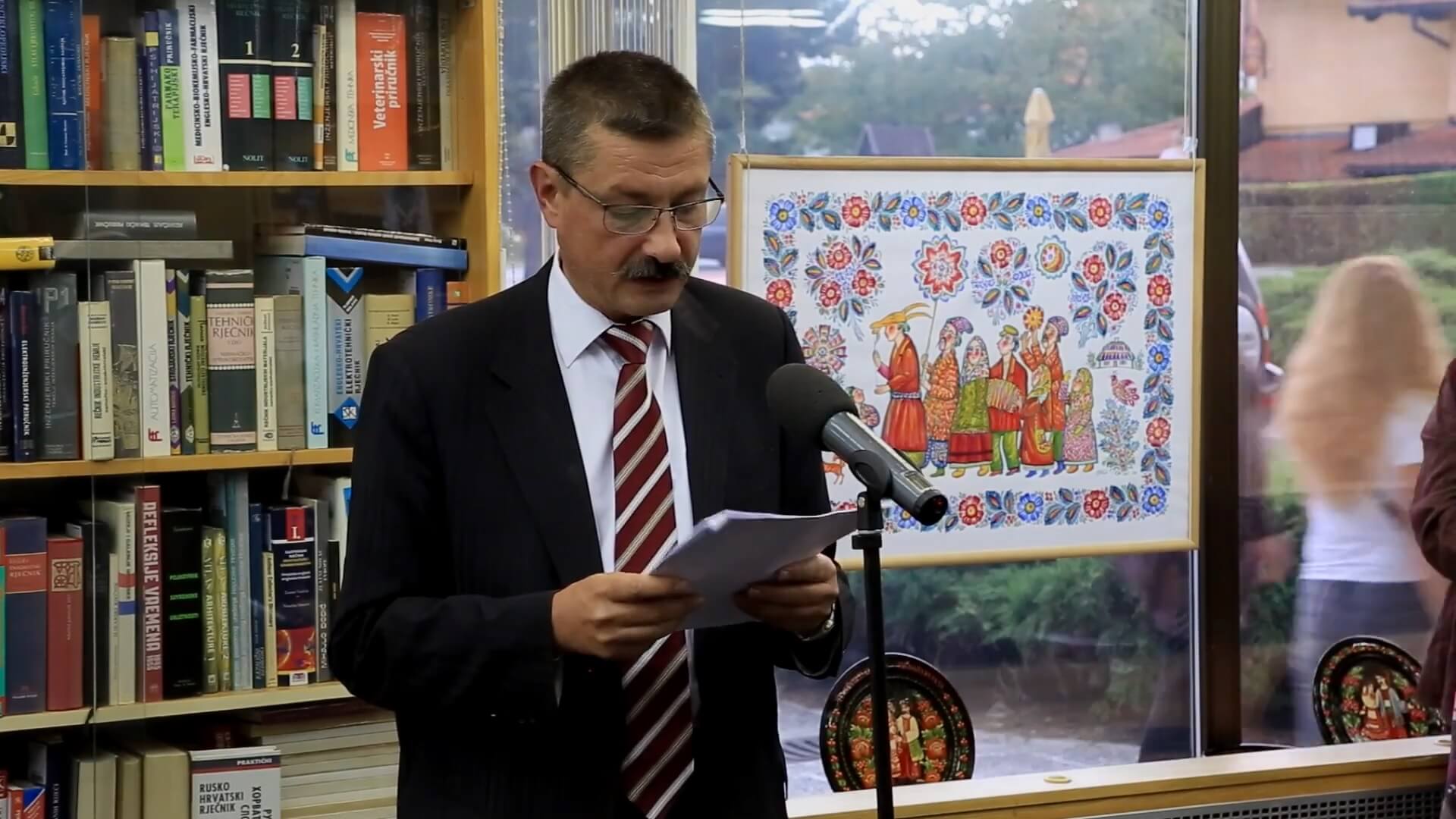
Jurij Lisenko reading his poetry at the exhibition opening of Ukrainian folklore "Petrikivski Rospis" in Samobor screenshot / Gradska knjižnica Samobor
Apart from that, the Lisenko family was very active and beloved on the Croatian poetry scene, and apart from presenting Ukrainian culture in Croatia, Jurij also introduced Croatian writers to Ukrainians.
The best instance of that is the Ukrainian translation of Croatian slam poet and writer Žarko Jovanovski and his short story collection „Tales of Lenin and Stalin“.
In addition, the good cooperation of the Ukrainian and Croatian writers is evident in an international literary magazine, Alternator, published by Sisak's Association For Alternative Culture, where Lisenko is a member of the editorial staff.
And the relevance of Lisenko as a partner for promoting Croatian writers in Ukraine was perhaps best described by the head of Edicije Božičević publishing house, Josip Ivanović.
„For a number of years, I knew a poet, diplomat, and genius Jurij Lisenko who I deeply respect. He is known in Ukraine more or less as an Avant Gard poet. And he published his book a long time ago. We walked around Lviv, and when there is a Lviv Book Fair, there are quite a lot of people and the atmosphere is as on a festival. Students approached him asking him to sign a book that he, as a poet, published 20 or 30 years ago. I never saw anything like that in Zagreb“, recalled Ivanović for Podcast Sekstant.
This shows not only that Ukrainians in general respect literature more than Croatians, but it is evident Lisenko is quite the rock star on the scene.
„I was very happy to see on Total Croatia a text on possibilities of foreigners in Croatia and that it was translated to 16 or 15 languages, including Ukrainian. I was very pleased with that. This means that connections between Ukraine and Croatia are significantly stronger. Indeed, in the last 10-15 years, Croatia became a favorite holiday spot for Ukrainians“, commented Lisenko.
Ukraine and Croatia – similar and friendly
With some differences between the Soviet Union and Yugoslavian communist practices, both Croatia and Ukraine share the same history of denied independence under a multi-national regime.
Đuro vidmarović, Croatian writer and former diplomat, told Laudato TV how the first Croatian president Franjo Tuđman appointed him as a Croatian Ambassador to Ukraine and how he was afraid as he wasn't sure what will await him there. But in the end, Ukraine for Vidmarović became a great topic and a happy period of his life. 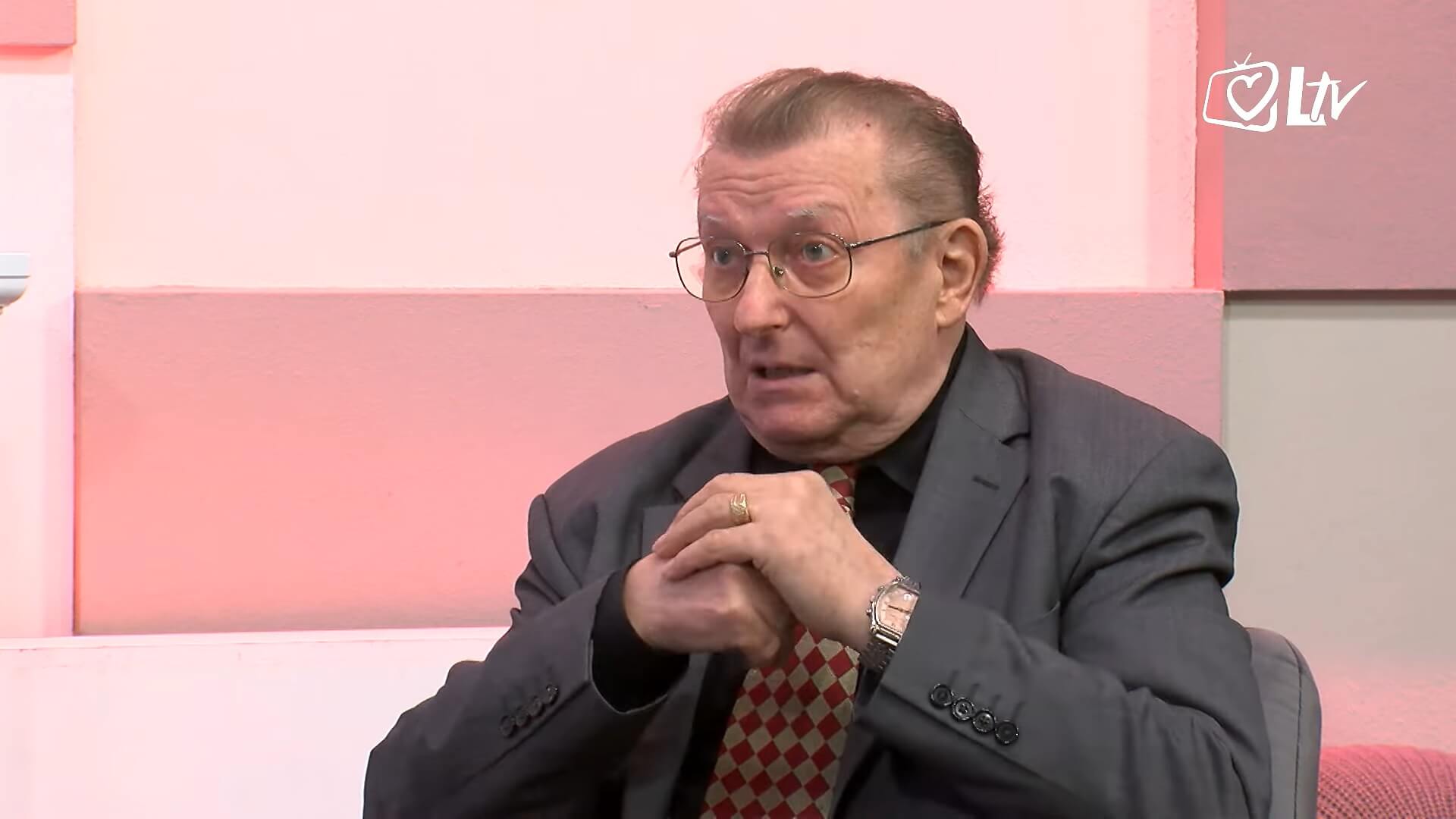
Former Croatian ambassador in Ukraine and writer Đuro Vidmarović, screenshot / LaudatoTV
„After I very quickly learned Ukrainian, a big area of Ukrainian culture and heritage opened up to me“, said Vidmarović adding that he met a lot of good colleagues there, particularly writers. As it was his mission to present Croatia, he also learned a lot and remained fascinated with the country of his mission.
„Ukraine is big, huge, contradictory, magical, unique, with a culture that makes it impossible for someone to stay indifferent. You come to Kyiv, and you see the Saint Sophia Cathedral from the 12th century with beautiful frescoes and architecture. My god, someone had to build it, had a sense for it. It was a civilization stronger from the majority of European countries at the time“, said Vidmarović for Laudato TV mesmerized with Ukraine he researches even to this day.
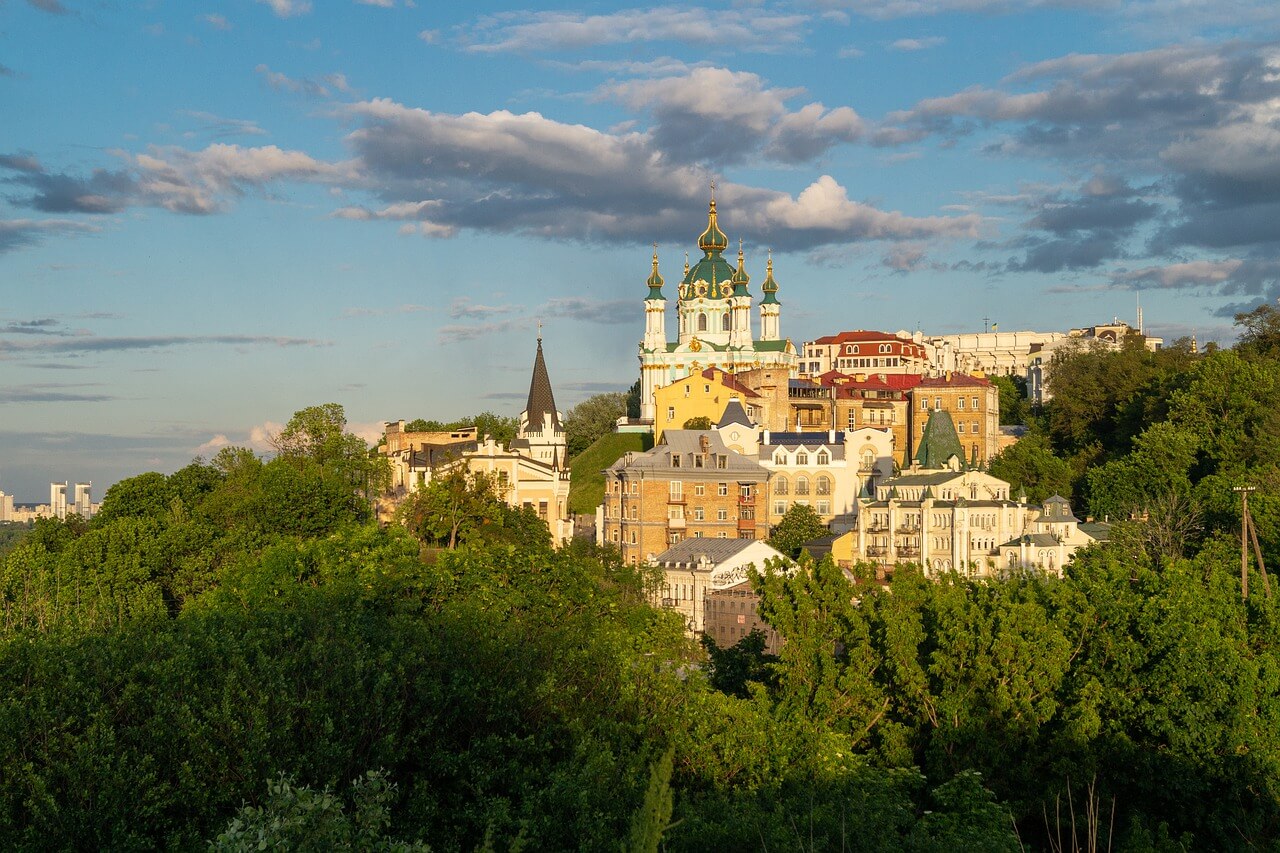
Breath-taking view of Kyiv © Pixabay
As Lisenko acknowledged, Croatia is also very famous in Ukraine too.
„Ukrainians discovered Croatia for themselves. Croatia is a beautiful country. You know that for yourselves. But, for Ukrainians, it is particularly pleasant in Croatia that they don't feel like strangers. But, for Ukrainians is a particular joy that languages are similar and Ukrainians, after several days, start to orient themselves in the language, to understand a bit, and can communicate with Croatians in cafes, restaurants, shops, streets, anywhere“, explained Lisenko for TCN.
He added that a lot of Ukrainians also come to Croatia searching for a job. While this may not be the best thing from the perspective of the Ukrainian economy (same as Croatians leaving Croatia isn't great for Croatian economic interests), Lisenko recognizes that the trend „also brings our two nations close“.
Discover Croatia in your native language
Apart from the article Lisenko commented on, Життя в Хорватії 2021: Витрати, дозволи, стиль життя та зустрічі з людьми, Ukrainians can also follow latest reports on COVID-19 in Croatia as well as 10 речей, які роблять Хорватію найкращою країною (or for English audience, 10 Things Croatia Does Better than Anywhere Else).
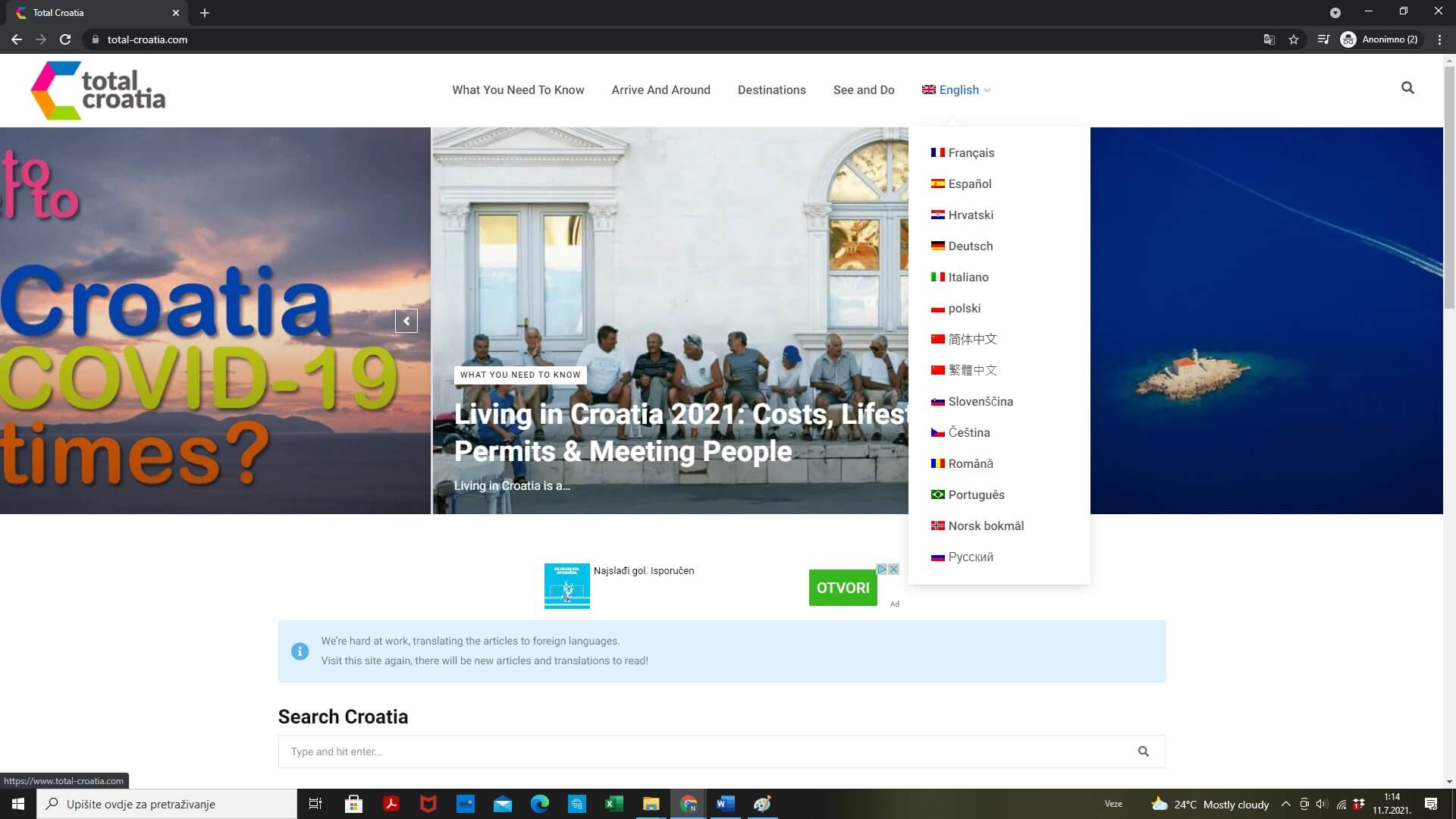
View of Total Croatia site and languages
So far, only these three articles are available in Ukrainian, but no doubt the future will bring more to make Croatia more accessible to beloved Ukrainian visitors.
Currently, TC counts 15 languages with the most translated content from English: Croatian, French, Spanish, German, Italian, Polish, Chinese (both traditional „zh-Hant“ and simplified "zh-Hans"), Slovenian, Czech, Romanian, Portuguese (Brazilian), Norwegian (Bokmål), and Russian.
If you want to learn more about diplomatic relations of Croatia, and everything regarding diplomacy and Croatia, check out TCN's series "Friends of Croatia" by Ivor Kruljac.
For more about Ukraine in Croatia, follow TCN's dedicated page.
VIDEO: Zagreb Earthquake 2020, One Year Later
March 22, 2021- On the Zagreb Earthquake 2020 first anniversary, TCN reporters Ivor Kruljac and Jose Alfonso Kusijanović took to Zagreb's streets to see how locals feel one year later.
6:24 AM March 22, 2020. It was Sunday, but sleep was as light as it was a workday full of obligations. Zagreb's citizens were awakened by a horrible sound followed by walls shaking, the ground trembling and things falling all over the place. Amid the coronavirus pandemic, at the very end of the first week of the first lockdown where it was advised to stay indoors to prevent the spread of the virus, there was no choice but to rush out of the house, discombobulated and without a clue of what exactly is the damage that 5.5 magnitude earthquake did. Individuals, couples, and entire families were outside but at a distance from one another, and just after the first aftershock, it started to snow. If you didn't leave the very center of Zagreb, the first sign of damage was the cathedral, whose top of the left tower collapsed, and only later you started to see the images of the center, which many compared online to Beirut. The Covid-19 National Response Team expressed its condolences on TV but warning everyone to keep the distance due to corona. Emergency services rushed to the city, later followed by the army. People who lost their homes were taken to student dorms and other locations with free space in the following days. Sadly, a 15-year-old-girl was fatally injured during the earthquake and passed away at Klaićeva's Children Hospital.
One year later, citizens of Zagreb still have mixed feelings about the event. Here are their answers in our short interview.
Shaking the memory
Senior citizen Ljerka was walking around European Square. Her home survived the quake, and the aftermath was books that fell from a shelf and broken bottles and jars in her pantry. She learned about that damage after a few days when she returned home from her sister's because she was too scared to be alone. The memory of last year still gives her the chills. „I jumped out of bed and lost my head; you have no idea where to go. You don't know what to do. I quickly grabbed something, half-dressed, rushed to the street. People were standing outside confused who didn't know where to go or what to do, nothing“, she said. Describing herself as an optimistic person, the scary experience is still stuck with her even one year later. „You remember it from time to time, but you can't forget it," said Ljerka.
A young guy named Dejan Jakovljević was casually walking around a crowded Dolac market, carefully with a mask to respect the measures in the crowds. He handled the earthquake pretty well as he lives in a new building with lots of concrete and reinforcement.
„It woke me up, but I knew it was an earthquake. It didn't scare me. I just waited for it to be over“, said Dejan. Responding to how he feels about it one year later, he briefly acknowledged that he „honestly forgot about it. “
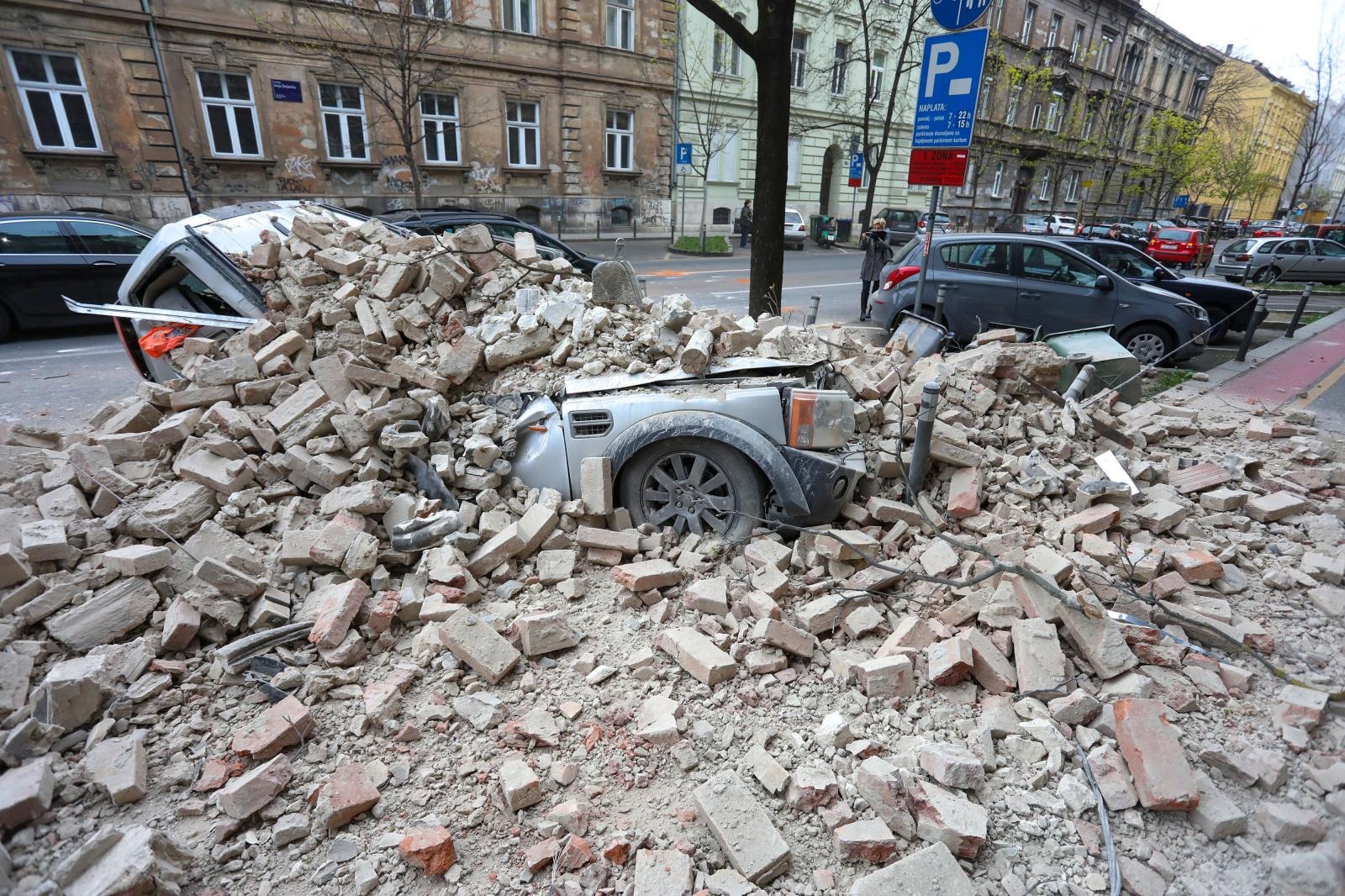
Borna Filic / PIXSELL
The same can't be said for American-born Stefanie Mikac from New York. We met her while she was walking her dog in Zrinjevac park. Her home was badly damaged. „I was in the bathroom dancing left and right. I didn't think it was an earthquake, I thought 'what is it, the devil had come!’ and there was smoke“, remembered Stefanie. When she realized it was an earthquake, she hid under the door, and when it passed, she searched for her dog that hid in the apartment before finally escaping her flat. On her trip to Hawaii, where earthquakes are quite frequent, she accepted that there is not much you can do against mother nature. Despite her bad experience, a year later, she feels safe in Zagreb. „Very secure, safe. You know, you have to take things as they come, “ said Stephanie sharing her positive attitude.
We spotted Mira Francem walking on Jelačić square. Her house was built following all the construction demands and proved to be earthquake-proof. Still, the rocky feeling isn't something that she liked. „I personally felt terrible. I had a feeling the whole world was collapsing, and in the end, that feeling of losing the ground under my feet is an instinct, you know?”, said Mira adding that even though her house is fine, the trembling ground was awful. When asked if there is still anxiety over the last year's event, she resoundingly repeated, “yes.”
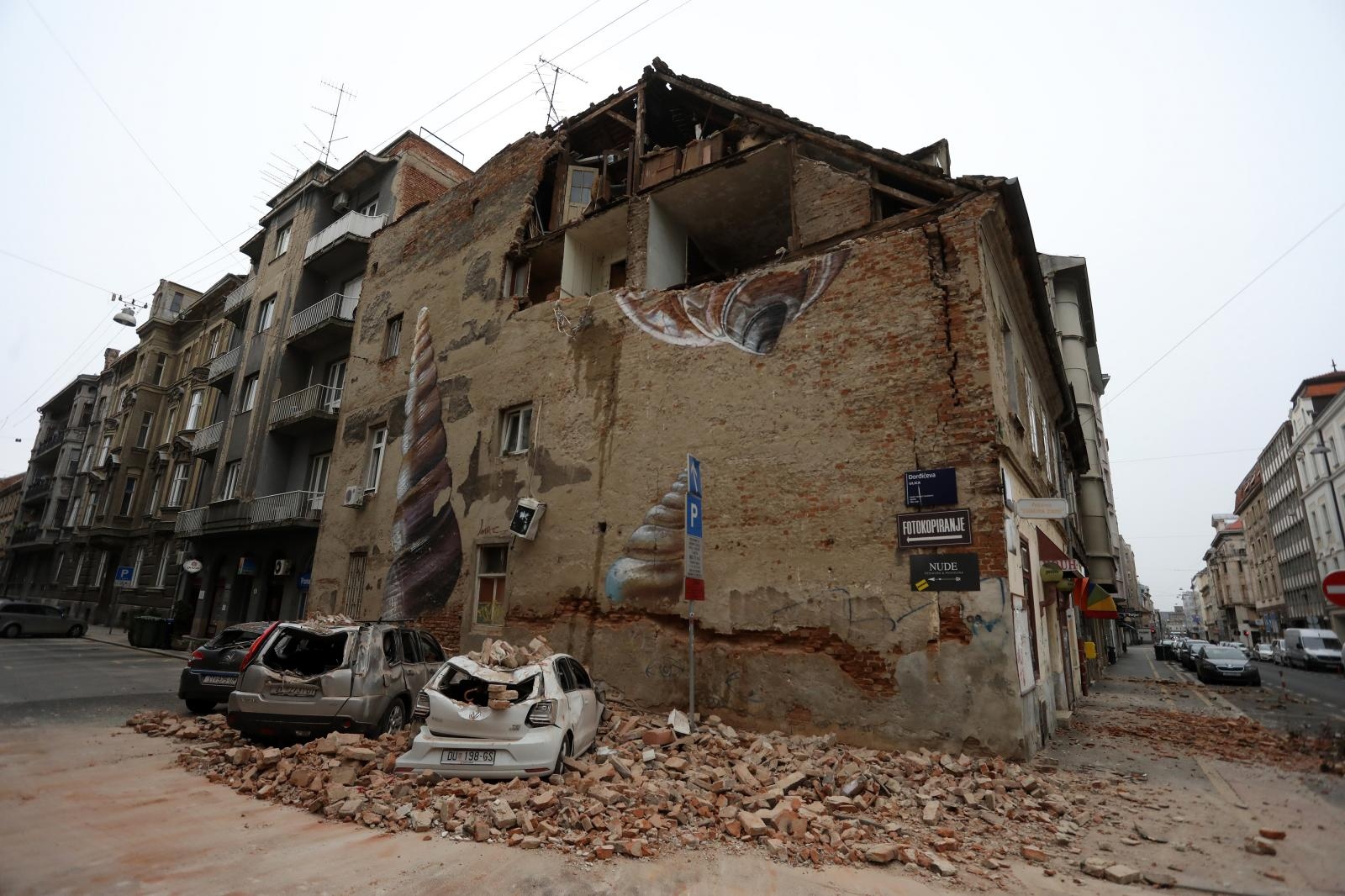
Borna Filic / PIXSELL
Mladen Habuš was standing on Vlaška street that connects European Square with Kaptol, where the City's cathedral is located.
“My home was okay. The earthquake surprised everyone at first, but fortunately, they don't last, so you stabilize psychologically”, said Mladen calmly, as if it didn’t really leave an impression on him.
“I already forgot about it because it's not as frequent as in Glina or Petrinja, whereas they say, it shakes every five minutes,” he emphasized, and that the key is to remain relaxed.
December – another round, another rumble
The second earthquake with a 6.4 magnitude that hit Petrinja and ravaged Banovina / Banija didn't damage Zagreb as it did to the southern part of central Croatia. Still, it was certainly felt, and many agreed it was stronger than the one in March.
„Jesus Christ! That one was even worse!“said Ljerka the second I mentioned the Petrinja earthquake. She learned that Zagreb is situated in a seismic active area, and earthquakes are something people in Zagreb need to learn to live with, but March didn't make her welcome the December tremble with more ease. She ran out of the house, not knowing what when her niece, who also lives in Zagreb, called her.
„I asked her if there was another earthquake in Zagreb. I didn't get anything. She said, 'no, that's the aftermath of Petrinja.' We are really close to Petrinja“, said Ljerka.

Nikola Cutuk / PIXSELL
Stephanie was walking her dog during the Petrinja earthquake. She witnessed bricks falling and was relieved nobody was passing underneath at the time. However, when she returned home, she entered the mess, and the damages that were still not fixed from March intensified. „All the cracks are wider now, and everything will need to be taken down to get to the healthy wall,” said Stephanie.
When asked if the December quake was easier or the same to handle for her, she laughed, acknowledging that it was actually worse. “We repeated the reactions from the first earthquake, you know? It's a very unpleasant feeling even today when a tram passes or something buzzes. I think something is trembling, and we are quite tense”, shared Mira. She said that no matter how rational you are, consequences as emotions are different from rationale. “I'm really sorry for those people. My house isn't damaged, but I was scared and lost, and I can only imagine how those people felt. It's a huge catastrophe on which we cannot influence,” said Mira with empathy.
Dejan felt the December quake was stronger but feeling safe in his building; he wasn't too worried. “I instinctively rushed to save the TV. Everything else was irrelevant”, recalled Dejan with gentle laughter underneath his mask.
Despite Mladen being relaxed after Petrinja, anxiety crept up on him too. “You start listening; someone starts a car, you raise your head to see what's going on. You are expecting another earthquake”, said Mladen. Still, he added that “you get used to it.”
Insurance vs. safe building
As revealed earlier this year, 85% of Croatian households don't have earthquake insurance.
Dejan doesn't know if the building had insurance but given his building proved safe, he didn't seem too concerned with that question.
Mira also didn't have insurance, but her investment in the safe building certainly paid off.
Stephanie's home was badly damaged, but she pays 1200 kuna annually for insurance and says it isn't too expensive in Croatia. However, regarding the walls in her home that need to be fixed, there was a bit of an issue. „The insurance company actually secured only the furniture, but then through a lawyer, we made a deal to cover half of it. Something is better than nothing“, said Stephanie.
Ljerka complemented her landlord and how she manages things. Her building received a green sticker but chimneys needed to be removed. Insurance helped there a lot. „We took down the chimney ourselves, and we got the money back, I think 3000 kuna, “ said Ljerka. The roof was renewed a year or two ago, but the same couldn't be said about the terrace residents have in the back of the building. Insurance didn't want to cover it, and a loan was needed to be taken for the fixture.
City officials to the rescue! Or not?
Both the country and international community, not to mention companies and individuals, rushed to help Zagreb, and the now-deceased mayor Milan Bandić found himself challenged to return Zagreb to its old glory and shine as fast as possible. The situation even called for a Zagreb reconstruction bill on the parliament level as the government took the lead in rebuilding the city. In the meantime, Bandić passed away, and with local elections coming up, the city's repair remains a topic for all the candidates that hope to take the lead chair of city politics in May.
Regarding the response of the city officials, Ljerka isn't happy.
„What did the city do? Nothing. It was all ruins. Look at what Zagreb looks like now after the earthquake. How long has passed, and nothing is done. Nothing. Only the houses that people renovated themselves, but the city gave nothing”, commented Ljerka. She did, however, add that the city doesn’t have money and that she understands that.
Mira shares Ljerka's opinion that the situation is better for those who organized repairs privately. Still, when it comes to the city authority response, she says, „it should have gone faster, better, and more organized. “
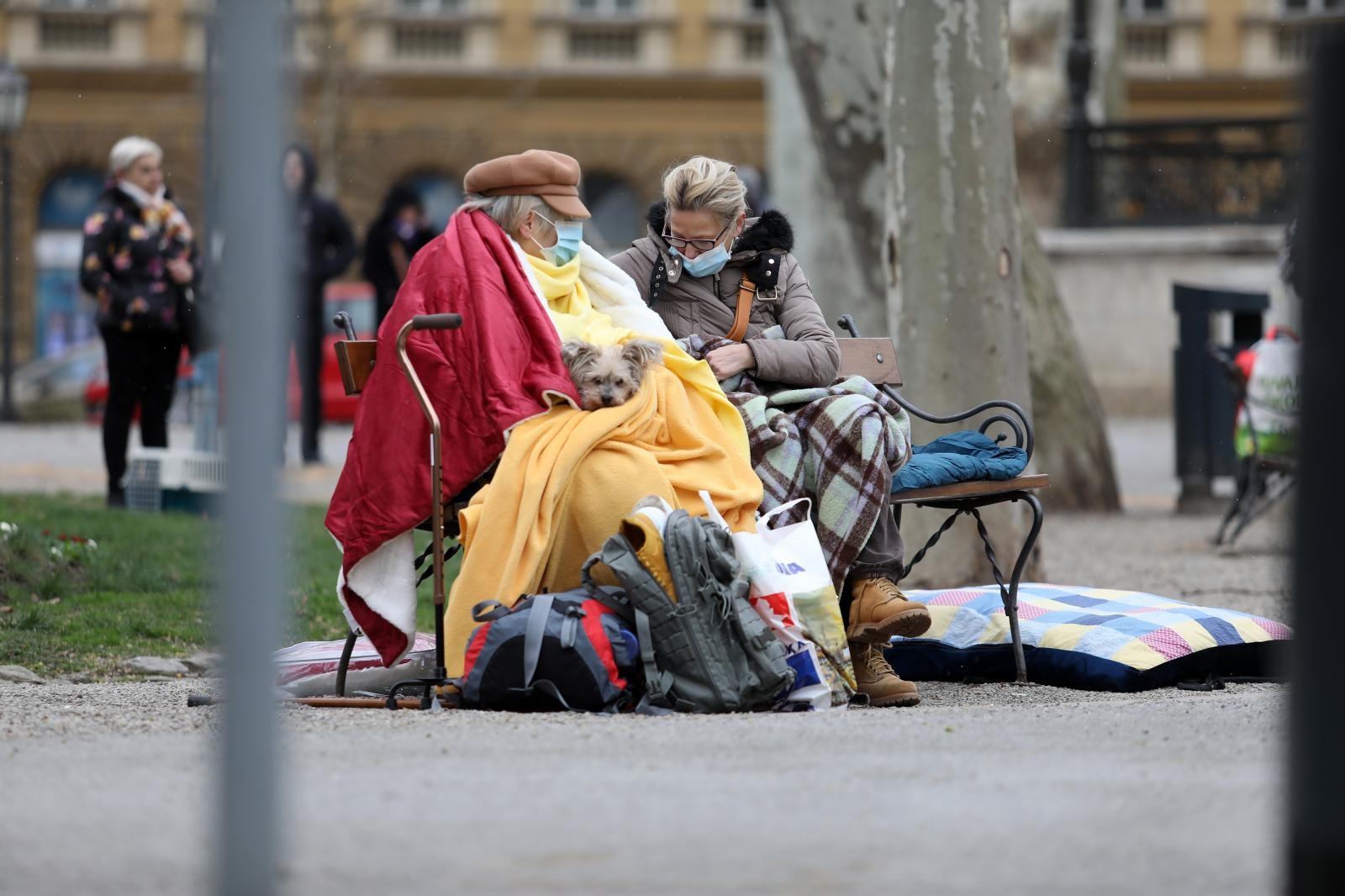
Borna Filic / PIXSELL
„I see a lot of my friends who live in the center. It's all at a standstill. For those who engaged themselves privately, it is better, but otherwise, it is prolonged. It needs to be better, more active, more engaged to ease the people and make them stronger."
Dejan also thinks that the authorities' response was not good and that “they should help people.“
When asked to comment on the city's response to the earthquake damage, Stephanie was hesitant at first. She feared many people would disagree with her opinion and her different way of thinking because she lived in the US.
“Over there, we have asbestos insurance and insurance for everything. If you have a bank loan and the bank has input on the house, you have to have insurance”, explained Stephanie asking me if it is fair for her to pay the insurance while others don’t and later demand the city to pay for everything. “Imagine if the city would fix apartments for everyone and secure the buildings. Nobody would ever do that anywhere. They may give you a percentage, but that's it,” concludes Stephanie.
Mladen is happy with the city's response.
“I think the city, to my knowledge and how much I followed, was the only one that jumped to help those who lost their homes and put them in free spaces,” Mladen pointed out. He also reminds us that the government took over the rebuild and the city is involved with 20%. When asked if it’s good for Zagreb that the government took the lead over the city, a resounding yes was the final answer. “The city doesn't have enough money, so the government needs to jump in," concluded Mladen.
Steady ground wishes above all
Being the biggest and the capital city of Croatia, which attracts people from everywhere in the country and beyond, Zagreb streets offered truly diverse answers to Jose and me. There was more or less fright on March 22, 2020, and different levels of anxiety today. Different views on insurance and the city’s response. We can only guess how differently they will vote in May. But one wish is the constant for the Purger's hearth - the wish to see Zagreb as a safe city where you only get awakened by an alarm clock.
For more about the earthquake in Zagreb, follow TCN's dedicated page.
Mediterranean As It Once Was: Sailing the Adriatic in the 80s (Video)
So many people asked me, why in the world would you take a sailboat all the way to Europe, to Yugoslavia? Well, it's the will to go where and when I please. It's a will that has existed in sailors ever since they crossed the smallest body of water. There's hardly a place where water flows that sailors cannot and will not sail. And only a fool would believe it was easy.
VIDEO: Magical South of Croatia: Stunning Birds-Eye View of Molunat and Mikulici
Dubrovnik is beautiful. What an over used phrase. Let the video speak for itself.


